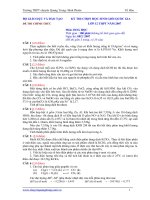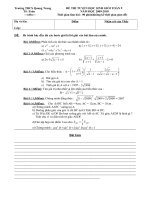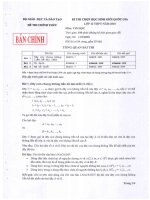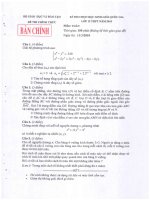De Thi Tuyen HS Gioi Quoc Gia 2010 Lam Dong
Bạn đang xem bản rút gọn của tài liệu. Xem và tải ngay bản đầy đủ của tài liệu tại đây (301.75 KB, 11 trang )
<span class='text_page_counter'>(1)</span><div class='page_container' data-page=1>
<b>ĐỀ THI TUYỂN HỌC SINH GIỎI QUỐC GIA – NĂM </b>
<b>ĐIỂM </b> <b>HỌ TÊN , CHỮ KÝ GIÁM KHẢO </b> <b>SỐ PHÁCH </b>
(Do CTHĐ chấm thi
<i>ghi) </i>
BẰNG SỐ BẰNG CHỮ GIÁM KHẢO GIÁM KHẢO 2
<b>ĐỀ CHÍNH THỨC </b>
(Đề thi gồm trang)
<b>SECTION 1: LISTENING (3 pts). </b>
HƯỚNG DẪN PHẦN THI NGHE HIỂU
<i>Bài nghe gồm 2 phần, mỗi phần được nghe 2 lần, mỗi lần cách nhau 15 giây. </i>
<i>Mở đầu mỗi phần nghe có tín hiệu nhạc, mỗi phần cách nhau 1 phút. </i>
<i>Thí sinh đọc kỹ câu hỏi và hướng dẫn trước khi làm bài. </i>
<b>Part 1: These people have to go somewhere. How will each person get there? Listen and circle the </b>
<b>correct answer. </b>
1. a. by bus
b. by car
c. by bicycle
3. a. by taxi
b. by car
c. by bus
5. a. by car
b. by taxi and subway
c. by subway and on foot
2. a. by car
b. by bus
c. by subway
4. a. by car
b. by bus
c. by taxi
6. a. by car
b. by bike
c. by bus
<b>Part 2: Listen to the conversation between a customer and an assistant and complete the gaps in the </b>
<b>tables. Write NO MORE THAN TWO WORDS AND/OR A NUMBER for each answer. </b>
<b>Price now </b> <b>Main </b>
<b>advantage </b>
<b>Second advantage </b> <b>Length of </b>
<b>guarantee </b>
<b>Main disadvantage </b>
Analogue
radio
£ 29.99 Cheap Excellent
<b> ……….with </b>
expensive systems
<b> </b>
…………
Service will finish at
some time
Digital radio <b> £……… </b> <b> Lots of </b>
………..
Little or no
interference
2 years <b> …..………..is </b>
short
<b>Old Value Card </b> <b>New Super Value Card </b>
Points Standard number Double points
Free credit period One month <b> . ………..months </b>
Interest rate . <b> ………. </b>
</div>
<span class='text_page_counter'>(2)</span><div class='page_container' data-page=2>
2
evenings
Benefits Free delivery within
<b> ………..miles </b>
Free delivery within 50 miles
<b>SECTION 2: LEXICO – GRAMMAR ( pts) </b>
<b>Part 1: Choose the word or phrase that best completes each sentence. Write your answer (A, B, C or </b>
<b>D) in the numbered box. </b>
. . ……… from the occasional late night party, our neighbours are very quiet.
A. Apart B. But C. Except D. As
2. There is a ………… of plant which is found only in this particular valley.
A. breed B. specimen C. class D. species
3. At the height of the property boom, even the smallest houses …………. vast sums of money.
A. looked at B. went for C. made out D. came on
4. It took the panel of judges a long time to agree ……… which book should win the prize.
A. to B. by C. on D. with
5. I think that successfully bringing up four children on your own has been no …………achievement.
A. pale B. mean C. slim D. poor
. It‟s hard to find a vaccine for influenza because there are so many different …………..of the disease.
A. species B. branches C. strains D. divisions
. After a fiasco at the start, the result of the horse race was declared null and ………..
A. void B. cancelled C. over D. barred
. There has been a ……….in the sales of new houses since mortgages became more difficult to obtain.
A. dive B. slump C. downfall D. crash
. I advise you to take ………. to ensure that all your property is adequately covered by insurance
A. means B. actions C. steps D. dealings
. No sooner had the refugees been evacuated from the town ………….the shelling started again.
A. when B. then C. as D. than
<b> Your answers: </b>
. 2. . 4. .
. . . . .
<b>Part 2: Write the correct FORM of each bracketed word in the numbered box </b>
Preparing for your first interview
Before going to an interview, It is advisable to go through a mock interview. This will give you the
opportunity to try out your technique and answers live. It is also a chance to receive feedback that is
<b>(1.benefit)……… in guiding you towards improving your interview style and general </b>
<b>(2.present)……….. Just one mock interview will result in a (3.notice) ……….. improvement in </b>
your interview skills. Why? For the same reason that a <b>(4.speak)……….. doesn‟t exist while it is still </b>
on paper or floating in your head. It only exists when you give it (5.oral)……….. The first time you
give it in front of an audience, it will come out nothing like the one you prepared.
</div>
<span class='text_page_counter'>(3)</span><div class='page_container' data-page=3>
<b>Your answers: </b>
. 2. . 4. .
. . . . .
<b>Part 3: Read the text below. Some of the lines are correct, and some contain an unnecessary word. If a line </b>
<b>is correct, put a tick (√) on the right column. If a line has a word which should not be there, write the </b>
<b>word on the right column. There are two examples and (00). </b>
Your answers:
0. Personal space is a term that refers to the distance we
00.like for to keep between ourselves and other people.
. When someone we do not know well gets too close that
2. we usually begin to feel uncomfortable. If such a
. business colleague comes more closer than 1.2 metres,
4. the most common response is to move away.
5. Some interesting studies have been done in libraries. If
6. strangers will come too close, many people get up and
7. leave the building; others use to different methods
8. such as turning their back on the intruder.
9. Living in cities has made people to develop new skills for
10.dealing with situations where they are very close to
11.strangers. Most people on so crowded trains try not to
12.look at strangers; they avoid skin contact, and are
13.apologise if hands touch by a mistake. People use
14.newspapers as a barrier between themselves and other
15.people, and if they still do not have one, they stare into
the distance, making sure they are not looking into
anyone‟s eyes.
√
For
………..
2………..
………..
4………..
………..
………..
………..
………..
………..
………..
………..
2………..
………..
4………..
………..
<b>Part : Fill each gap in the following sentences with one of the prepositions or particles in the box. Use </b>
<b>each word only ONCE and write your answer in the numbered box. </b>
<b> up out in behind down </b>
<b> away with round through after </b>
1. If you don‟t like having injections, it is a good idea to look …………..when the doctor sticks the needle
into your arm.
2. Why don‟t you come ………….. to our house for dinner on Saturday?
3. “Does John take ………his mother or his father?”
“Well, he looks just like his father, but he has his mother‟s nature.”
4. “What happened to the television set?”
“ I got ………with the payments, so they came and took it away.”
5. He twisted my arm to make me tell what I knew, but I refused to give …………..
6. To make someone look foolish or to embarrass him in front of other people is to show him ………....
7. I don‟t think that red blouse really goes …………..your orange skirt, dear.
8. I can lend you five pounds to help you ………until you‟ve had time to go to the bank.
. We‟ve made all the arrangements. Let‟s hope our plans don‟t fall ………..at the last moment.
. To criticise everything that someone does or to tell other people that he is no good is to run him
………
<b>Your answers: </b>
</div>
<span class='text_page_counter'>(4)</span><div class='page_container' data-page=4>
4
. . . . .
<b>Part 5: Insert A, AN, THE or (Ø) (zero article) where necessary. Write your answer in the numbered </b>
<b>box. </b>
Every month we‟re giving away ( ) …….... magical holiday. Don‟t miss this unique opportunity to sample
(2)……….. luxury of our Transglobe holidays in one of the world‟s most sought-after destinations: ( )
…….. Pacific. Or perhaps you have a secret passion to travel to (4)……… destinations such as Venice,
experience ( ) ……….. exciting adventure in ( )………… sport car, or learn to cook ( )……….. Eastern
delicacies in ( )………. Orient. Just log on to our travel service website and, if you don‟t win, you can find
( )………… latest destinations and advice on how to plan a trip. At the end of each holiday, we‟ll give you
( )………... vouchers to be used towards your next holiday with us.
<b>Your answers: </b>
. 2. . 4. .
. . . . .
<b>SECTION 3: READING ( pts) </b>
<b>Part 1: Read the following passage and decide which answer (A, B, C or D) best fits each gap. Write </b>
<b>your answer in the numbered box. (0) has been done as an example. </b>
Why did you decide to read this, and will you keep reading to the end? Do you expect to understand every
( )………. part of it and will you remember anything about it in a fortnight‟s ( )………… ? Common sense
(2) ……….. that the answers to these questions depend on “readability” – whether the ( )……….. matter is
interesting, the argument clear and the (4) ………… attractive. But psychologists are discovering that to ( )
…………. why people read – and often don‟t read – technical information, they have to ( ) ………… not so
much the writing as the reader.
Even the most technically confident people often ( ) ………… instructions for the video or home computer
in favour of hands-on experience. And people frequently ( ) ………...little notice of consumer information,
whether on nutritional labels or in the small print of contracts.
Psychologists researching reading ( )…………. to assume that both beginners and ( ) ………… readers
read everything put in front of them from start to finish. There are ( ) ………. among them about the ( 2)
………. of eyes, memory and brain during the process. Some believe that fluent readers take ( ) ………
every letter or word they see; others ( 4) ……… that readers rely on memory or context to carry them from
one phrase to another. But they have always assumed that the reading process is the same: reading starts,
comprehension ( )………., then reading stops.
0. A. absolute B. one C. single D. unique
1. A. term B. period C. time D. gap
2. A. suggests B. transmits C. advises D. informs
3. A. subject B. topic C. content D. text
4. A. pattern B. formation C. layout D. assembly
5. A. ensure B. determine C. value D. rate
6. A. examine B. inquire C. trace D. calculate
7. A. miss B. omit C. pass D. ignore
8. A. get B. pay C. take D. make
9. A. tend B. undertake C. lead D. consent
10. A. competent B. sufficient C. considerable D. valid
11. A. objections B. arguments C. contests D. separations
12. A. role B. concern C. share D. relation
13. A. up B. over C. out D. in
</div>
<span class='text_page_counter'>(5)</span><div class='page_container' data-page=5>
<b>Your answers: </b>
0. C
. 2. . 4. .
. . . . .
. 2. . 4. .
<b>Part 2: Read the following passage and choose the correct answer (A, B, C or D) to each of the </b>
<b>questions that follow. Write your answer in the numbered box. </b>
<b> </b>
ART COULD TAKE PAIN OUT OF PUBLIC TRANSPORT
Travelling on British public transport could become a pleasurable, artistic and educational experience,
according to a report.
This could be achieved by simple and inexpensive measures such as information sheets on inter-city journeys
detailing sights and monuments; language and „places to visit‟ workshops on ferries; children‟s coaches with
videos and storytelling on trains; artwork in airport departure lounges; and poems, photographs and paintings
on buses and trains and at bus and railway stations.
The study of the arts in the transport system is fiercely critical about the lack of public art and notes that
mostly it is limited to paintings.
Naseem Khan and Ken Worpole, the arts policy researchers who wrote the report, conclude that well
thought-out and positioned initiatives like Poems on the Underground (posters of poems in tube train
carriages) can improve the experience of travel and gain dedicated fans.
Generally, though, hours spent on public transport are “spent in a state that can range from boredom to
annoyance. Travelling has become a depressing experience, a state in which one thinks of nothing in order to
minimise unpleasantness.”
But people who travel abroad bring back memories of Stockholm‟s metro system, with art in each station
reflecting the world above, be it a park or a university, or Melbourne‟s artist-painted buses.
The authors point out that Britain‟s transport system used to stir the imagination. Sepia photographs of
resorts used to decorate old railway carriages, old London Transport posters encouraged travellers to explore
their own city and in the Thirties a travel guide was sold on the London-Penzance express, detailing the route
and giving historical information.
Public art, the report says, too often gives the impression of having been slipped in quietly in the hope that it
will have been accepted before it has been noticed. The wall designs which decorate the passageways at
Heathrow airport are described as “dull and unexciting”. But praise is given to the sculptures at Brixton
railway station. While the report says that there is no substitute for good architecture and design, some of its
most interesting recommendations call for more imaginative developments than just concentrating on the
visual arts. “The presence of personal stereos and new technology suggest the introduction of fresh
developments such as journey tapes containing information on, or music and poetry related to, the sights
being passed.”
Live performance carries the danger of being a nuisance, but videos on trains travelling to festivals,
containing information on shows, with booking available from train phones, would, says the report, provide a
welcome service.
“There is scope for a journey to be turned into a positive experience rather than being merely a passive
period to be lived through. Journeys are not among the trials of life but among the opportunities.”
1. The researchers concluded that
A. the public are not interested in art on public transport.
B. art on public transport should be carefully situated.
C. art on public transport should be very simple.
D. paintings are not suitable for public transport.
</div>
<span class='text_page_counter'>(6)</span><div class='page_container' data-page=6>
C. It no longer provides information about places
D. It has been put in different places from in the past.
3. According to the researchers, what is wrong with public art at the moment?
A. It is in old-fashioned styles.
B. It irritates the public.
C. It does not stand out enough.
D. It does not make travellers relaxed.
4. What should be introduced, according to their report?
A. musicians playing on public transport
B. material for travellers to listen to
C. more paintings on public transport
D. videos in railway stations
5. The researchers approve of the art on public transport in
A. Stockholm and Brixton.
B. Melbourne and Heathrow
C. Penzance and Brixton
D. Stockholm and Heathrow
6. Which statement best sums up the researchers‟ opinions?
A. On public transport modern art is better than older styles.
B. Travellers dislike the art they see on British transport.
C. Art on British transport should be made more striking.
D. There should be lots of paintings on public transport.
<b> Your answers: </b>
. 2. . 4. . .
<b>Part 3: Read an article about visiting the UK. Choose the most suitable heading from the list A-I for </b>
<b>each part (1-8) of the article. There is one extra heading which you do not need to use. Write your </b>
<b>answer in the numbered box. </b>
A. Contrasts in capital D. A step in the right direction G. Top cuisine
B. Places to avoid E. Sensitive to social position H. Travel troubles
C. Fascinating variety F. Shocking cost I. Moving north
………..
The latest edition of the Single World Guide declares boldly that Britain is a stunning place to visit in almost
every way. In addition to positive descriptions of the country in general, there are numerous comments that
will come as a surprise to many who feel this country has little to boast about when it comes to gastronomy.
The guide claims that the best of British food is every bit the equal of French cooking. Are those horror
stories about overcooked vegetables and tasteless meat a thing of the past?
2……….
Well, not quite. The guide does mention that a number of cheap cafés still serve unappetising and unhealthy
meals that would be virtually tasteless if they didn‟t have large quantities of brown sauce. While the
inspectors – two from Britain, four from other countries – seem frankly amazed that such establishments still
exist, they also note that there are fewer of them than was the case ten years ago, when the last edition of the
guide was published.
……….
</div>
<span class='text_page_counter'>(7)</span><div class='page_container' data-page=7>
inspectors seem most impressed by the blend of the ancient and modern that can be found all over the
country, but especially in London, where the traditional and the innovative rub shoulders.
4……….
The guide does, however, mention one side of life in the capital that will be familiar to both visitors and
residents: the expense of doing virtually anything here is as staggering as it was ten years ago. Indeed,
several aspects of everyday life here, such as the price of tube fares, appear to startle the inspectors more
than anything else about the country.
………
Special mention is made of two cities that have emerged relatively recently as vibrant, exciting locations for
culture and entertainment, able to rival cities in the south. Manchester and Glasgow are described as warm
and energetic, definitely places for the visitor to the UK to see.
……….
There are, of course, some words of warning for the traveller to this island. A number of famous tourist
attractions are described as over-rated and over-priced, with Buckingham Palace prominent in the list of
sights that the visitor could well do without seeing, whatever the hype attached to them.
……….
The guide makes a point of recommending specific areas of many cities where ethnic diversity can be
enjoyed and celebrated, with shops and restaurants offering goods from all over the world. In many cases,
these establishments are run by people who came to Britain as immigrants and have enriched the society with
aspects of their own highly interesting cultures.
……….
The guide concludes its summary of Britain by mentioning the curious, old-fashioned class consciousness to
be found there. Some English still judge each other according to their place of birth, school, accent, family
name and family wealth, rather than their individual personality and skills. For a small percentage of English
people, class remains an important factor.
<b>Your answers: </b>
. 2. . 4.
. . . .
<b>Part 4: Fill in each blank with one suitable word. Write your answers in the numbered boxes provided </b>
<b>below the passage. </b>
We live surrounded by objects and systems that we ( ) ……….. for granted, (2) ……….
which profoundly ( ) ……….. the way we behave, think, work, play, and in general lead our
(4)………. . Look, for example, at the place in ( ) ……… you are reading this now, and see
how much of ( )……… surrounds you is understandable, how much of it you could
( )………. build yourself or repair if it ( ) ……… cease to function. When we start the car or
( ) ………. the button in the elevator, or buy food in the supermarket, we ( ) …………. ….no thought
to the complex devices or systems that ( )………the car move, or the elevator rise, or the food
appear on the shelves. ( 2)……….this century we have become increasingly ( )……… on
the products of technology. They have already changed our lives: at the simplest ( 4)………., the
availability of transport ( )……… made us physically less fit than our ( )……….. . Many
people are alive only because they have been given immunity to ( )…………
through drugs. The vast ( )……….of the world‟s population relies ( )………the ability
of technology to provide and transport food. We are (2 )……….. to feed or clothe or keep ourselves
warm without technology.
<b>Your answers: </b>
. 2. . 4. .
. . . . .
</div>
<span class='text_page_counter'>(8)</span><div class='page_container' data-page=8>
. . . . 2 .
<b>SECTION 4: WRITING (6 pts) </b>
<b>Part 1: Sentence transformation </b>
<b>A. Finish each of the sentences in such a way that it means exactly the same as the sentence printed </b>
<b>before it. </b>
. They will not announce the decision formally.
No formal ……….
2. Its lack of irregular verbs makes Esperanto a unique language.
Unlike ………..
3. You have little realization of how much I have sacrificed for you.
Little ……….
4. Thanks to Laura‟s support I was able to finish the project.
Had it ………
5. In the summer, there are thousands more tourists than locals.
In the summer, the locals are vastly ………..
<b>B. Use the word given in brackets and make any necessary additions to write a new sentence in such a </b>
<b>way that it is as similar as possible in meaning to the original sentence. Do NOT change the form of the </b>
<b>given word. </b>
1. Mike is never reluctant to make tough decisions as a manager. (shrinks)
……….
2. I really don‟t know what you are talking about. (faintest)
……….
3. She passed the word around that she was looking for a flat. (known)
……….
4. A government official leaked the story to the world press. (wind)
……….
5. As I intended to expand my shop, I made an offer for the premises next door. (view)
……….
</div>
<span class='text_page_counter'>(9)</span><div class='page_container' data-page=9>
0
20
40
60
80
100
120
2000 2001 2002 2003 2004 2005 2006 2007 2008
<b>Years</b>
<b>N</b>
<b>u</b>
<b>m</b>
<b>b</b>
<b>e</b>
<b>rs</b>
<b> s</b>
<b>h</b>
<b>o</b>
<b>wn</b>
<b> i</b>
<b>n</b>
<b> th</b>
<b>o</b>
<b>u</b>
<b>s</b>
<b>a</b>
<b>n</b>
<b>d</b>
<b>s</b>
Sandown Zoo
Botanical Gardens
Victoria Park
Children's Zoo
opened 2007
Restaurant
opened 2002
Boating Lake
opened 2005
………
………
………
………
………
………
………
………
………
………
………
………
………
………
………
………
………
………
<b>Part 3: A Secondary Education Office is doing some work on young people’s attitudes towards </b>
<b>reading. They are asking you to write down your reactions to this statement: </b>
<i><b>Reading books is a waste of time. There are lots of better ways of studying and using your free time these </b></i>
<i><b>days. </b></i>
<b>Write a composition (about 300 words), giving your personal opinions and explaining why you agree </b>
<b>or disagree with the statement. (Do not include your personal information.) </b>
</div>
<span class='text_page_counter'>(10)</span><div class='page_container' data-page=10>
</div>
<span class='text_page_counter'>(11)</span><div class='page_container' data-page=11>
………
………
………
………
………
………
………
………
………
………
………
………
</div>
<!--links-->









